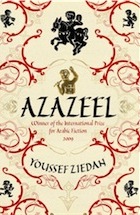Azazeel by Youssef Ziedan, translated by Jonathan Wright – review

Egyptian Coptic church has been upset by the novel’s portrayal of St Cyril.
Maya Jaggi
4/5/2012
Even before Azazeel won the International Prize for Arabic fiction (or “Arabic Booker”) in 2009, copies of the novel were piled high at Cairo’s pavement booksellers. Its unusual setting in early Christian, pre-Islamic Egypt fuelled interest, along with its teasing literary frame, whereby an archaeologist in late 20th-century Syria uncovers 30 confessional scrolls penned by an Egyptian monk some 1,500 years before. But curiosity was soon piqued by controversy, as the Coptic church voiced outrage at the portrayal of St Cyril of Alexandria as a rabble-rousing fanatic.
The novel follows the picaresque passage through faith, doubt, temptation and torment of Hypa, monk, physician and – risibly, to many he meets – poet from southern Egypt. His pilgrim’s progress entails whisperings from the devil, and erotic interludes with the widow Octavia, Alexandrian servant of a Sicilian silk merchant, and Martha, a singer. He composes hymns and sleeps seated, in his monastic cell (“There are Egyptian tombs that are larger”). A reluctant witness to the age’s terrors, Hypa writes his memoirs in a monastery near Aleppo, at the inner prompting of the accursed Azazeel, otherwise known as Satan or Beelzebub. Though Hypa’s mother-tongue is Coptic, he knows Greek and Hebrew, and writes in Aramaic – or Syriac, as the language of Christ becomes known. His humble good nature and bewildered horror are at times reminiscent of Robert Graves’s Claudius.
Born in AD391, when Christianity was imposed as Roman Egypt’s official religion, the young Hypa travels north to Alexandria, city of “whores and gold”, “salt and cruelty”, where Christians are no longer a persecuted minority. Pope Cyril sermonises from a gilt pulpit, his gold robes contrasting with the rags of the Christ statue behind him. Cyril sees himself amid sedition, in a holy war against Jews (whom he casts out of the city), heretics, pagans and idolaters. He is also set against science, abhoring “astronomy, mathematics and magic”. Its symbol is Hypatia, the historical figure with whom Hypa is briefly infatuated. A neo-Platonist philosopher and mathematician, and a charismatic teacher, she was lynched by a Christian mob in AD415 – savagery that Hypa witnesses. In fleeing the city – along with many scholars of the time – he baptises himself Hypa in honour of her.
Hypa is aghast at the violence sweeping the “land of God … in the name of Christ”. Yet as his fatherly mentor in Jerusalem, Bishop Nestorius, points out: “Killing people in the name of religion does not make it religious … those are people of power not faith.” As bishops in the imperial centres of Rome, Alexandria and Constantinople vie for power, and church jostles with state, Hypa plays a humble role as translator in doctrinal rifts and schisms. The nub is whether the Virgin Mary is the mother of God: “Do you believe that Jesus is God, or is He the messenger of God?” Or, as a feverish Hypa imagines Azazeel asking mischievously: “Did God create man, or was it the other way round?” The Syrian-born Nestorius is adamant that “humans do not give birth to gods” – a belief that eventually sees him deposed for heresy. The novel hints that this doctrinal split stems from cultural differences between Greco-Egyptian and desert Arab views of divinity, rather as Hypa still alludes to the ancient god Khnum, who fashioned humans from clay.
The theological wrangling also reflects earthly ambition. Hypa is troubled by his mentor Nestorius’s unholy pact with the Emperor Constantine: “Help me in my war on unbelievers and I will help you in your war with Persia. Give me an Earth free of heresy and I will give you the keys to Heaven.” Equally troubling is another dogma he finds in a Yemeni monk, who sees femininity and women as the “cause of every misfortune”, and abhors singing – especially by girls.
In Jonathan Wright’s supple translation there are memorable passages, from a monkey shaking dry dates from a palm, to the perilous pleasure of swimming in the buoyant sea rather than the crocodile-infested Nile. Yet, if the novel often lacks descriptive richness, its strength lies in its ingenuous narrator and the resonant play of ideas. Youssef Ziedan, a scholar who founded the manuscript centre and museum at the New Library of Alexandria, knows his sources. Through late antiquity, he explores humane views of sexual passion and women’s learning, and exposes violence perpetrated in the name of the sacred. As for dogma, the novel suggests how seemingly immutable doctrines are shaped by the beliefs they purport to leave behind.

[…] Read the full news: Azazeel by Youssef Ziedan, translated by Jonathan Wright – review […]